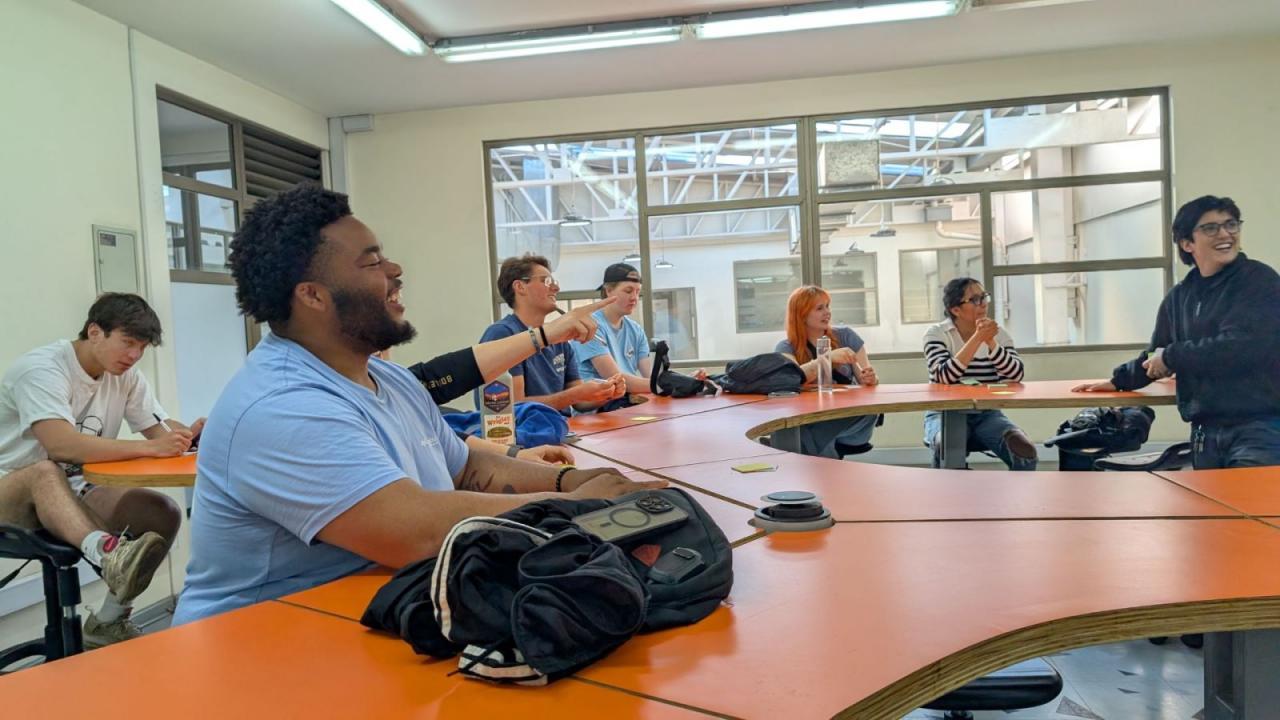Purdue Polytechnic students recently returned from a transformative 15-day study abroad program in Peru and Chile. The three-credit course focuses on human-centered design (HCD), intercultural learning, and global collaboration through immersive academic and cultural engagement.
Co-led by Rustin Webster, an associate professor in the School of Engineering Technology, and Jen Ramos, a senior global programs specialist in the Office of Globalization, the course was designed to help students to explore HCD in international contexts while developing essential global competencies. The program reinforces Purdue Polytechnic’s commitment to experiential education and preparing students for careers in an increasingly globalized and human-centered world.
During the program, students completed the Global Up Abroad curriculum, earning the AFS Global Competence Certificate and three credits. The AFS Global Competence Certificate (GCC) is a blended learning program that develops tangible global skills essential to live, work, and make a real social impact around the world.
Student teams were also assigned a human-centered design project, which required that students observe human experiences and identify opportunities, or “problems,” that needed innovative solutions. The teams then generated a conceptual prototype solution to their chosen problem.
“There were many opportunities to examine problems within other countries. Peru and Chile are very different cultures compared to the United States, and this is something you notice as soon as you get off the plane,” Isaiah Rivas said. Rivas is currently a mechanical engineering technology student. “Overpopulation was the main factor in many minor issues identified. Our prototype was to allocate more money and resources to other smaller cities to increase their economy and encourage people to move to other cities in their country.”
Students began in Peru where they engaged in cultural and educational exchanges with the Universidad de Ingeniería y Tecnología (UTEC) in Lima. UTEC students joined the group for collaborative scavenger hunts through the vibrant neighborhoods of Miraflores and Barranco, encouraging shared discovery, cross-cultural dialogue, and teamwork.
“Collaborating with local institutions such as UTEC provided both the Purdue and Peruvian students a space to get to know one another and connect,” said Ramos. “It wasn’t just about being in another country—it was about experiencing it together with local peers.”
Students also visited Alicorp and Amanatari. Alicorp, one of Peru’s largest industrial manufacturers, gave students insight into automation practices, smart manufacturing technologies, and the evolving influence of Industry 4.0. An engaging meeting with Amanatari, a nonprofit focused on conserving the Amazon rainforest by empowering local populations to ensure a healthy planet, inspired students with their people-centered model and offered a deeper understanding of the intersection of design, sustainability, and social impact.
“This program focuses on intercultural immersion and reflection, which allows students to build on their technical skills with cultural awareness needed in today’s interconnected world,” Ramos said.
The group then traveled to Cusco, where they explored Incan cultural heritage sites including Machu Picchu, Chinchero, and Moray, and visited Universidad Nacional San Antonio Abad del Cusco (UNSAAC) to engage with local students and faculty. Purdue students enjoyed meeting local university students and made fun memories playing sports with them on campus.
In Chile, the program partnered with Universidad Técnica Federico Santa María (UTFSM) in Valparaíso. Purdue students participated in logistics and (HCD) workshops led by UTFSM faculty, while UTFSM students assisted with site tours and cultural excursions. These included a scavenger hunt through Viña del Mar, a guided walking tour of Valparaíso’s historic and artistic districts, a group picnic on the scenic sand dunes of Concón, and a tour of a Chilean vineyard in Casablanca that highlighted regional agricultural practices and export industries.
The group then visited Terminal Pacífico Sur (TPS), the main cargo port in Valparaíso, and Rhona, a prominent electrical equipment manufacturer, to learn about logistics, automation, and the implementation of Industry 4.0 technologies in Chilean industry.
“Students came away from this experience realizing that great design requires global awareness,” Webster said. “They learned to navigate cultural complexity while staying grounded in empathy and purpose.”
Purdue alumni also connected with students during Purdue for Life alumni suppers hosted in Lima and Viña del Mar. These events offered a chance to network with Boilermakers living and working abroad and gain perspectives on international career pathways and global professional communities.
“The alumni events were a highlight,” said Webster. “They offered students living proof that their careers can take them anywhere—and that they’ll always be part of the Purdue family.”


